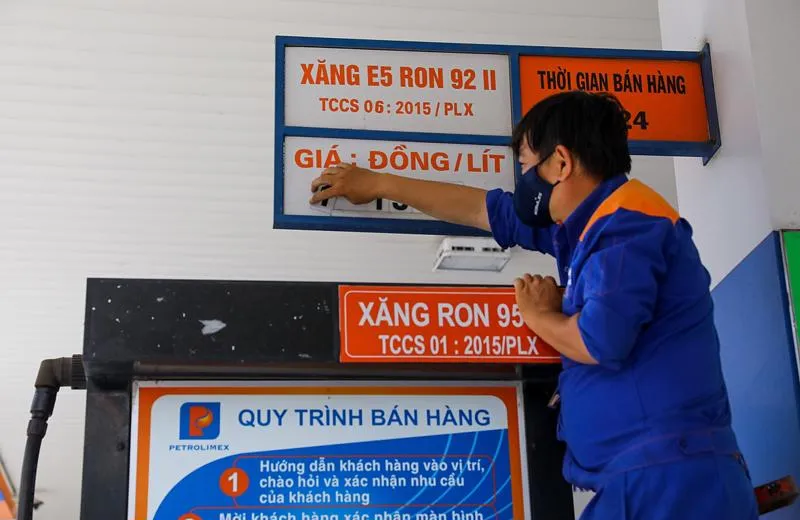
Even though Vietnam has only a 1.2% import-export turnover with the Russian and Ukrainian markets, the negative impact of this crisis will be felt by all export enterprises.
Exports on hold
Among the top ten seafood exporting companies to Russia at this time is the Kien Cuong Seafood Processing and Importing Joint Stock Company, which is now temporarily suspending exports to the Russian market. Mr. Doan Hoang Chien, Director of Kien Cuong Seafood Processing Company, said that because of concerns of risks from the Russia-Ukraine conflict to goods transportation, documents, and payments, his company has temporarily put on hold all exports to the Russian market.
Currently, the Russian market accounts for about 30% of total export market share of the Kien Cuong Seafood Processing Company. When asked if exclusion of Russia from the Swift international payment system had affected the payment of partners for previous export orders, Mr. Chien said that old orders had been shipped before Tet, so the payments have all been completed.
Seafood is one of the main exports to the Russian market. Although seafood export turnover to Russia is still quite modest, at about USD 164 mn in 2021, the Vietnam Association of Seafood Exporters and Producers (VASEP) always assesses this market as a potential market. Mr. Truong Dinh Hoe, General Secretary of VASEP, said that the impact on the seafood industry is not large because the market share of both Russian and Ukrainian markets is still small, but 50 businesses have licenses for both markets and they are all being affected from this crisis.
First of all is the problem of old payments on old orders, and now Vietnamese enterprises and partners are looking for solutions to resolve this. Currently there are some shipments on way to Russia, and export enterprises must calculate whether they can continue or not. They may also suffer some damages if goods are returned. As for the manufactured goods that cannot be exported, enterprises have temporarily suspended the process and are waiting and watching the situation carefully. This will have a huge influence on the psychology and production and business activities of all export enterprises.
Some businesses claim that documents sent to Russia are being rejected as domestic banks are not accepting them and so orders cannot be shipped without proper documents. Businesses now have to find ways to resolve this impasse. The Ministry of Industry and Trade has advised associations and businesses of the possibility of goods being delayed at customs for several days, leading to consequent delays in the payment process, especially for contracts under money transfer after delivery method.
The Ministry of Industry and Trade now recommends to exporters to apply measures to prevent risks in payments, before entering into a contract. For small orders, businesses can pay via the KFT channel built by the Russian Foreign Trade Bank (VTB). In five years since implementation, the KFT system has operated stably and is capable of serving bilateral payment activities between the two countries.
Other factors
According to the Ministry of Industry and Trade, the two-way trade between Vietnam and Russia in 2021 reached USD 7.1 bn, up 26% compared to 2020, accounting for over 1% of Vietnam's total import and export turnover. The two-way trade between Vietnam and Ukraine in 2021 reach USD 720 mn, up 50% compared to 2020, but accounting for only 0.1% of Vietnam's total import and export turnover.
Hence, the ongoing Russia-Ukraine conflict is not affecting Vietnam's imports and exports in a very big way. However, businesses and many other related associations are concerned about several other factors right now, and not so much on the export to these two countries.
The first thing that exporters are most worried about is the rising oil price, which is pushing up the cost of shipping of all goods. Mr. Doan Hoang Chien said that the current increase in sea freight rates is far too high, and it is directly affecting the profits of exporters in Vietnam. Since last year, the freight rate has caused difficulties for most of the exporting enterprises, but they are unable to do anything about it. Now the current raging conflict between Russia and Ukraine has made freight costs even more higher, with no solution in sight.
Besides the rising freight costs, many types of input materials are also becoming costlier, while output prices cannot be raised immediately because consumer purchasing power in most countries is still low. This has made businesses lose out on profits as they have to bear the burden of rising freight costs.
The negative impact from the Russia-Ukraine conflict is worrying many businesses, as they feel that all exports to Europe will be affected as a result of this present turmoil. The main reasons are that because of this conflict, European consumers will tend to spend less, and also because their many European partners importing Vietnamese agricultural products will not be able to re-export them to Russia, as they have been doing in the past. Hence, the impact of this conflict will be felt in very many ways.
Besides this, competition for export of goods with other countries will become even more fierce. It is not just Vietnam that will face difficulties in exporting to Russia and Ukraine, but many businesses from other countries will also face the disastrous impact of this crisis. Businesses will now have to find ways to redirect exports to other markets.
Mr. Doan Hoang Chien believes that competition will be inevitable and in 2022 enterprises will have to step slowly and cautiously as it is difficult to have long-term plans like in previous years. Mr. Chien thinks that this will be a difficult year for exporters as the pandemic situation is still quite complicated and uncertain, and the conflict between Russia and Ukraine has no immediate solution in sight.




















